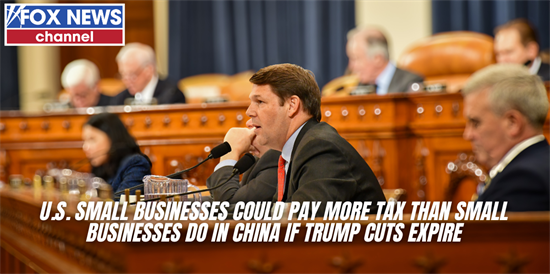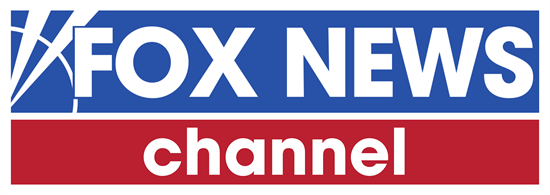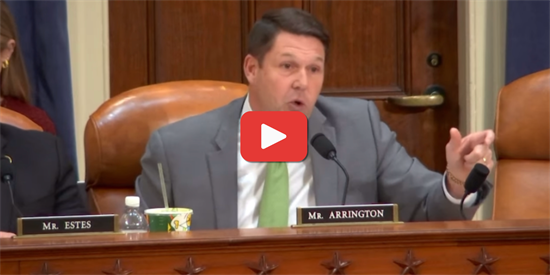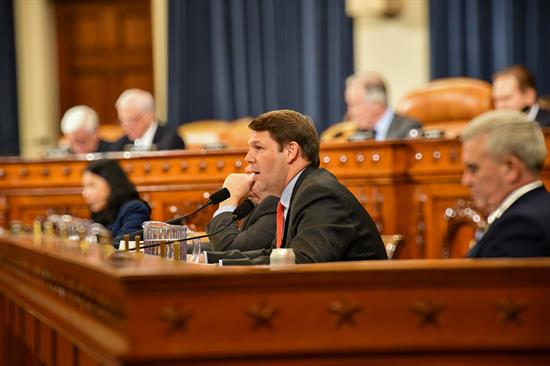In the News
FOX NEWS: US small businesses could pay more tax than small businesses do in China if Trump cuts expire'What's pro-American about that?' questioned GOP Congressman Jodey Arrington.
Washington,
January 14, 2025
Tags:
Economy
GOP tax leaders: US small businesses could pay more tax than small businesses do in China if Trump cuts expire'What's pro-American about that?' questioned GOP Congressman Jodey Arrington.By Alex SchemmelJanuary 14, 2025 Republicans on the House Ways & Means Committee, the House's chief tax writing committee, pointed out during a Tuesday hearing that if Congress lets President-elect Trump's tax cuts from his first term expire, millions of small businesses in the United States will see a top tax rate that is higher than what small businesses in communist China pay. Tuesday's hearing launched debate in the new Congress over how to handle Trump's expiring tax credits, key provisions of which are slated to expire later this year. Among those key provisions is a new 20% tax deduction ushered in by Trump in 2017, known as Section 199-A, which provides tax relief for qualified trade or business expenses incurred by taxpayers that are not corporations. But, if Trump's Section 199-A deduction expires later this year, small business owners could see their top tax rate more than double to 43.4%, which is roughly 20 points higher than what businesses in communist China face, Ways & Means Chairman Rep. Jason Smith, R-Mo., laid out in a report earlier this month and reiterated during Tuesday's hearing. "If Congress fails to act … 26 million small businesses will be hit with a 43.4 percent top tax rate, more than 20 points higher than what businesses pay in Communist China," Smith said Tuesday. "I guess my colleagues want to go back to when we had higher tax rates than communist China," said Rep. Jodey Arrington, R-Texas. "What's pro-American about that? How are we going to unleash economic growth, job creation, and prosperity with that kind of tax rate? We reduced it to 21% and we're not even in the top quarter of the most competitive tax rates. So, I guess my colleagues want to go back to the highest business tax rate in the free world. It makes no sense."
"The 21% rate in the United States of America – when you add the average state rate across the United States – is at 25%," added Rep. Kevin Hern, R-Okla. "Our greatest adversary in the world economically – no one is even close – is China at 25%." Allison Couch, the founder of Ignite Accounting and one of the witnesses present at Tuesday's hearing, referred to 199-A as "the single most beneficial deduction for small business owners." "Allowing this deduction to lapse when it has been in place for so many years will not feel like a sunset, but a tax increase," said Couch, who also submitted a report into the congressional record during Tuesday's hearing from global accounting firm Ernst & Young, which indicated 25.9 million small businesses in the United States utilize the 199-A deduction. Other provisions that Republicans and the pro-TCJA witnesses at the hearing called on to become permanent included Trump's beefed up child tax credit, which doubled parents' eligible deduction, his death tax reforms, which doubled the amount heirs could pass on before being taxed, and lower marginal tax rates for individuals, a move that one witness said Tuesday has helped workers earn more take-home pay.However, Democrats at the hearing argued that an extension of Trump's tax cuts will benefit the ultra wealthy more than anyone else. They also argued that Republicans are ignoring the deficit impact, and not providing adequate solutions for how to pay for the extended cuts, noting that increased deficits could result in increased interest rates, a grater cost burden for middle-class people and less economic growth. "There's no free lunch here," said Brendan Duke, senior director of economic policy at the left-leaning Center for American Progress. "The tax cuts will likely be paid for eventually in the form of spending cuts or tax increases down the line. In the meantime, continued, or even higher deficits could mean continued or even higher interest rates. That makes housing, student loans and credit card debt less affordable for working people." "Republican reliance on tariff taxes to off-set their tax breaks for the super wealthy will continue to shift the tax burden to some of the very type of businesses that [Republicans want to protect]" warned Democratic Texas Rep. Lloyd Doggett. "The biggest loser of their plan overall will be our debt, but the impact that that has on the solvency of Social Security, and Medicare and other investments, is also very critical. So, as we move forward we need to consider all of these impacts and look for a tax code that is mor fair for working Americans and less of a gift to those at the top."In response to the battle in Congress over the expiring tax cuts, a fiscally conservative political advocacy group, Americans for Prosperity, launched a $20 million campaign to urge lawmakers on Capitol Hill "to protect prosperity" by renewing Trump's tax cuts. |





